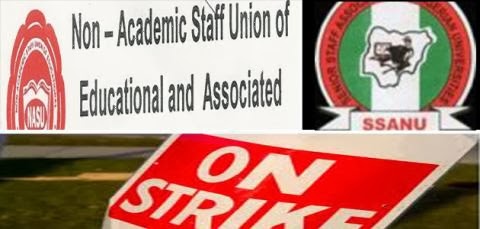África/Nigeria/Marzo 2016/Fuente: Vanguard. Autor: Victor Ahiuma-Young
Resumen: Los miembros de la Unión de Personal no académico de Instituciones Educativas y Asociadas de Nigeria (NASU) en el Consejo de Exámenes del África Occidental, al final de su 36º Congreso Nacional anual, en Jos, estado de Plateau, emitió un comunicado de 9 puntos en el que, reconociendo los esfuerzos del gobierno nigeriano para palear la crisis económica producto de los bajos precios del petroleo, hacen un llamado al gobierno a declarar el estado de emergencia en el sector de la educación, como una forma de elevar el nivel, la calidad de la enseñanza y el aprendizaje en las instituciones de Nigeria.
Non-Academic Staff Union of Educational and Associated Institutions, NASU, has decried the falling standard of education and the appalling state of schools across the country, blaming it on the low budgetary allocation by the government.
Members of NASU in the West African Examination Council, WAEC, in a 9 point communiqué at the end of their 36th annual National Congress, in Jos, Plateau State, called on the government to declare a state of emergency in the educational sector as a way of raising the standard, quality of teaching and learning in the nation’s institutions of learning.
In a communiqué issued by Mr. O. S. Obabunmi and Mrs. O. I. Aje, Chairman and Secretary, respectively, at the end of the conference, NASU lamented the consequences of low budgetary allocation to the sector were being manifested «in falling standard of education and the appalling state of our schools across the country. Therefore, the Congress-In-Session urges the government to declare a state of emergency in the educational sector as a way of raising the standard and quality of teaching and learning in our institutions.»
While equally lamenting the alarming rate of examination malpractices in the nation’s schools, the Congress-In-Session called «on the federal, state and other stakeholders to collaborate with WAEC and other examination bodies in fighting examination fraud in our country. The legislators are hereby called upon to enact enabling laws that would be strong enough to check the activities of those who use modern technology to perpetrate examination injustice and fraud in the country.»
NASU members while appreciating government efforts at addressing the epileptic power supply in the country vehemently opposed the increase in electricity tariff without a corresponding improvement in the power supply.
They contended that the increase had decreased the purchasing power of an average Nigerian and demanded that the «government as a matter of urgency reverses the hike in electricity tariff which tends to plunge the average Nigerian in perpetual misery and poverty.»
NASU in the communiqué also decried the poor state of the Nigerian economy occasioned the dwindling oil prices which the country solely depends on.
The statement added: «This has led to persistent calls for the devaluation of the Naira as a panacea to the economy. We recall with nostalgia, the negative effect of Structural Adjustment Programme (SAP) of the Ibrahim Babangida led Military regime and subsequent devaluation of the Naira by successive governments which the country is yet to recover from its ugly effects. The Congress-in-Session therefore, strongly opposes and rejects the call for further devaluation of the Naira, as it has never in the past solved our economic woes. Rather, the Federal government should put policies in place to diversify the economy and improve the infrastructural development that will strengthen the economy.»
Fuente de la noticia: http://www.vanguardngr.com/2016/03/nasu-demands-state-emergency-educational-sector/
Fuente de la imagen: http://1.bp.blogspot.com/-1inqTCdy0a8/UnQNEnK_KNI/AAAAAAAAwdw/mHNYaveXrHA/s1600/SSANU+Strike+Paralyse.jpg
Socializado por: Editores África








 Users Today : 78
Users Today : 78 Total Users : 35460209
Total Users : 35460209 Views Today : 112
Views Today : 112 Total views : 3418895
Total views : 3418895